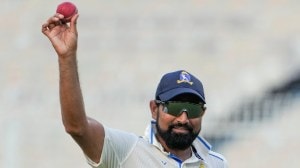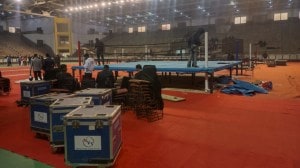Henry sliced through Brazil146;s own game
At age 34, Zinedine Zidane has prematurely lost much of his hair but little of his magnificent soccer skill...

At age 34, Zinedine Zidane has prematurely lost much of his hair but little of his magnificent soccer skill, which was on stirring display Saturday night as France ousted the five-time champions Brazil from the World Cup.
It was Zidane8217;s looping free kick in the 57th minute that forward Thierry Henry volleyed into the net for a 1-0 victory, setting up a semi-final against Portugal on Wednesday.
While Brazil appeared lethargic, almost uninterested 8211; until they were forced into a frantic attempt to level the score 8211; France beat the defending champions at their own beautiful game: crisp short passes on the ground, ornamental footwork and an effervescent spirit.
Brazil, who had appeared in the previous three World Cup finals, winning twice, never achieved their usual joyful brand of samba soccer in this tournament. And now they exit, having been thoroughly beaten twice by Zidane and France in the past eight years in soccer8217;s global championship tournament.
In 1998, Zidane, widely considered one of soccer8217;s greats, scored two goals in a 3-0 victory over Brazil in the final of the World Cup outside Paris, setting off the largest celebration on the Champs-Elysees since the end of World War II.
He is scheduled to retire after this World Cup, but his going-away party has been postponed for at least one more match. He seems free, unburdened by pressure or expectation, exulting in a fabulous deferment of the end of his career.
On Saturday, Zidane spryly juggled the ball on his thigh. He fired wraparound passes. He dashed vigorously and creatively from one flank to another. And he dribbled intricately around and through the Brazilian midfielders as if they were cones on a practice field.
8220;Precisely because he8217;s going to retire, he8217;s fully invested in this game,8221; Raymond Domenech, France8217;s coach, said of Zidane. 8220;He doesn8217;t have to calculate anything. Every moment is perhaps his last one.8221; Meanwhile, Brazil was left exhausted, lacking in urgency and curiously indolent until the final half hour of play.
Ronaldinho, considered the world8217;s best player, was pushed from midfield up to forward, but he failed again to become sufficiently involved. Instead, Ronaldinho disappeared into a smothering French defence that used as many as nine men to silence Brazil, and he was thoroughly outperformed by Zidane as a playmaker.
Ronaldo, overweight and sedentary at forward, did not threaten until near the end, when he began to run with great determination at the French defence. Often, he just stood around. Once, he fell clumsily in the penalty area.
Brazil8217;s outside backs, Cafu and Roberto Carlos, launched one purposeless pass after another. And, in the closing minutes, Roberto Carlos could only manage to walk upfield as his team desperately needed a goal to force overtime.
Afterward, Ronaldo walked disgustedly off the field, not bothering to shake hands with Zidane, until now his teammate at Real Madrid. Midfielder Ze Roberto fell onto his back, his hands covering his face. He seemed shocked in defeat and was no doubt tired from having chased Zidane all game.
The exit of Brazil, considered by many heavy favourites to win the tournament, allowed France to join Portugal, Italy and Germany in the first all-European semi-finals since 1982.
8220;I wasn8217;t prepared for defeat,8221; said Brazil8217;s coach, Carlos Alberto Parreira. 8220;It never crossed my mind we wouldn8217;t come to the final. It8217;s a very hard moment.8221; Parreira, who led Brazil to the 1994 World Cup title, said in a bristling way that losing was always the coach8217;s fault. He would not say whether he would continue as coach. He wondered aloud whether Brazil had adequately welded its individual brilliance into a team.
Meanwhile, the victory continued an extraordinary resurgence for France. It had departed in embarrassment in the first round of the 2002 World Cup, without having scored a goal. Many believed the team had aged indelicately after winning the 1998 World Cup and the 2000 European championship. Before this tournament, Les Bleus, as the French team is known, received harsh criticism from the French news media and fans. Some players even said they no longer wanted to play in Paris.
And when France struggled early in group play, Domenech, 57, was jeered during introductions before a victory over Togo. The lingering tension was apparent Saturday when Zidane refused to speak with reporters at a news conference after the match. 8220;We needed a great match and we delivered,8221; Zidane was quoted as saying to Reuters immediately after the match. 8220;We knew we would have to be fit physically and we were. We fought closely together for a well-deserved victory. Now we8217;ll try to win a place in the final. We don8217;t want to stop now. This is so beautiful, we want it to carry on.8221;
France have also received criticism from the far-right politician Jean-Marie Le Pen, head of the anti-immigrant National Front. Le Pen, as he has done many times, has accused the team of using too many black players. And he has said the squad was not sufficiently respectful in singing the national anthem.
The World Cup victory in 1998, achieved with a diverse team with backgrounds in the former French colonies, was considered a victory for multiculturalism and a repudiation of Le Pen8217;s position. That team was widely hailed while winning in its own country. And this one is already being embraced.
8211;JERE LONGMAN
- 01
- 02
- 03
- 04
- 05






























